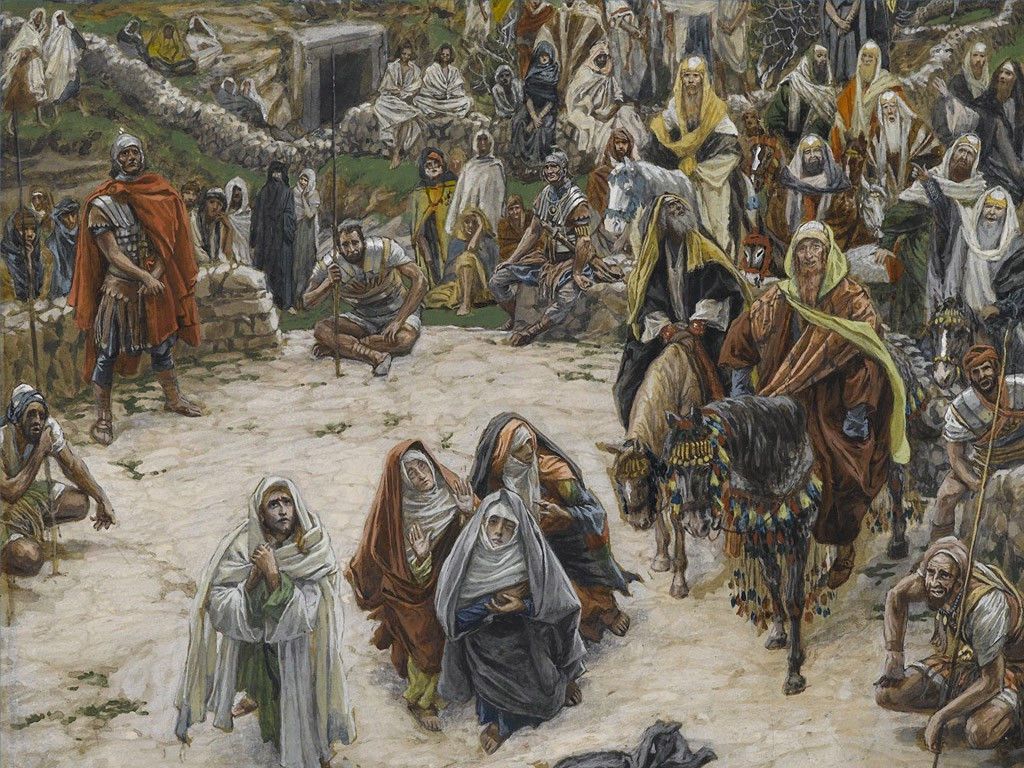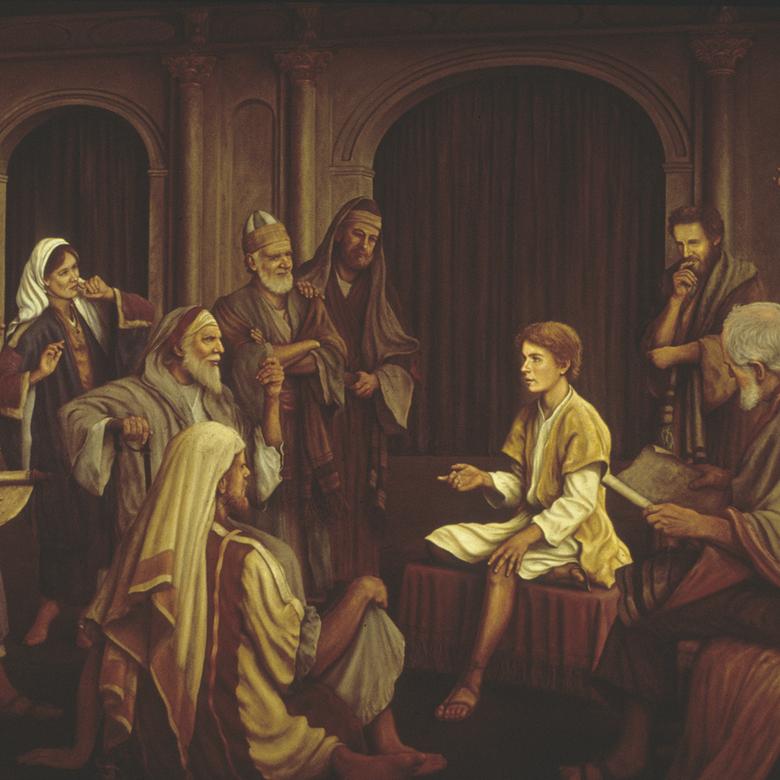Yesterday was Good Friday. We take time on that day to consider deeply what Jesus suffered for us. There are many paintings of Christ on the Cross, but few that try to show what He saw as He hung there. This one, by Jame Tissot, is, I think, thought-provoking.
From the Cross, Jesus uttered some very dramatic words: “Father, forgive them, for they know not what they do”; “This day you shall be with me in Paradise.” Other words may not have been quite as dramatic, but they were full of meaning on a personal level. As Jesus looked down and saw His mother and the disciple John standing there, He offered comfort even in the midst of His suffering.
When Jesus saw His mother and the disciple whom He loved standing nearby, He said to His mother, “Woman, here is your son.” Then He said to the disciple, “Here is your mother.” So from that hour, this disciple took her into his home.
John 19:26-27
As one commentator has noted, “Mary was poor. It would even seem that now she had no home. Jesus, in his dying moments, filled with tender regard for his mother, secured for her an adopted son, obtained for her a home, and consoled her grief by the prospect of attention from him who was the most beloved of all the apostles. How lovely appears the dying Savior, thus remembering his afflicted mother, and making her welfare one of his last cares on the cross, and even when making atonement for the sins of the world.”
Some might have us believe Jesus didn’t have any special regard for his mother or his family. This passage in Luke, chapter 2, is mentioned:
Every year His parents went to Jerusalem for the Feast of the Passover. And when He was twelve years old, they went up according to the custom of the Feast.
When those days were over and they were returning home, the boy Jesus remained behind in Jerusalem, but His parents were unaware He had stayed. Assuming He was in their company, they traveled on for a day before they began to look for Him among their relatives and friends.
When they could not find Him, they returned to Jerusalem to search for Him. Finally, after three days they found Him in the temple courts, sitting among the teachers, listening to them and asking them questions. And all who heard Him were astounded at His understanding and His answers.
When His parents saw Him, they were astonished. “Child, why have You done this to us?” His mother asked. “Your father and I have been anxiously searching for You.”
“Why were you looking for Me?” He asked. “Did you not know that I had to be in My Father’s house?” But they did not understand the statement He was making to them.
Then He went down to Nazareth with them and was obedient to them. But His mother treasured up all these things in her heart.
And there is this Scripture in Matthew 12:
While Jesus was still speaking to the crowds, His mother and brothers stood outside, wanting to speak to Him. Someone told Him, “Look, Your mother and brothers are standing outside, wanting to speak to You.”
But Jesus replied, “Who is My mother, and who are My brothers?” Pointing to His disciples, He said, “Here are My mother and My brothers. For whoever does the will of My Father in heaven is My brother and sister and mother.“
In both cases, it was a matter of priority. God comes first. At the crucifixion, the will of God came first; He offered Himself up for us all. Yet even while doing so, He made provision for His mother.
Why was John chosen to be Mary’s new son? Mary was most certainly a widow at this point in her life and also an older woman. Though she had other sons, Jesus chose John to provide care for Mary after His death. Why? Jesus’s brothers did not become believers until after His resurrection. Further, Jesus’s brothers were not present at His crucifixion. Jesus was entrusting Mary to John, who was a believer and was present, rather than entrusting her to His brothers, who were not believers and who were not even present at His crucifixion.
As the oldest son in His family, Jesus had a cultural obligation to care for His mother, and He passed that obligation on to one of His closest friends.
John was one of the inner circle of Jesus’s disciples, along with Peter and James. He was with Jesus on a number of occasions when the other nine disciples were not. He was present at the raising of the dead daughter of a synagogue leader; he witnessed the glory of the Transfiguration; he was given the task of preparing the Passover that we now know as the Last Supper, at which he reclined right next to Jesus. At Gethsemane, he was one of the three that went with Jesus to watch and pray—yes, he failed at that, but he was chosen to be there. When Jesus was on trial, his connections with the family of the high priest allowed him and Peter to go in to the area where Jesus was being interrogated. He was the only disciple who stood at the foot of that Cross, and later, the first of the disciples to run to the empty tomb after the Resurrection.
At the end of his gospel, John provides this testimony:
Peter turned and saw the disciple whom Jesus loved following them. He was the one who had leaned back against Jesus at the supper to ask, “Lord, who is going to betray You?” When Peter saw him, he asked, “Lord, what about him?“
Jesus answered, “If I want him to remain until I return, what is that to you? You follow Me!” Because of this, the rumor spread among the brothers that this disciple would not die. However, Jesus did not say that he would not die, but only, “If I want him to remain until I return, what is that to you?“
This is the disciple who testifies to these things and who has written them down. And we know that his testimony is true.
John was also the author of Revelation and the last of the original apostles to die; perhaps the only one to die a natural death.
Bottom line: Jesus died for all, but He knows each one of us personally. He loved His mother and made sure she was taken care of. He loved John and trusted him with the care of His mother.
His love extends to each one of us in just the same way.



